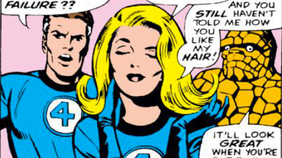Light and Dark: Ozymandias and Rorschach
- hannahlien
- Apr 29, 2015
- 3 min read

The clearest dichotomy that Moore creates in Watchmen is that of Rorschach and Ozymandias. They are each other’s opposites in all regards. Ozymandias is a handsome, successful liberal, while Rorschach is an ugly, right wing vagrant. With the revelation that Ozymandias has masterminded the entire plot of the story, it becomes more evident that the two men are total opposites. Killing the Comedian, turning the world against Doctor Manhattan, and constructing an attack against New York, all in the name of the “Greater Good,” Ozymandias shows a moral flexibility that Rorschach doesn’t possess in the slightest.
While Laurie and Dan resolve to give up and allow Ozymandias’ plan to unfold, Rorschach is the only one unwilling to submit. Though he orders Doctor Manhattan to kill him, an order to which Manhattan complies, had he lived, it’s likely that Rorschach would have taken efforts to reveal the truth of what happened to the world. Even with Rorschach dead, his actions may eventually reveal Ozymandias’ involvement in the destruction of New York, though this depends entirely upon whether or not his journal gets published by the New Frontiersman.
Though Ozymandias is cast as a sort of villain, his murderous plot only slightly counterbalanced by his desire to create world harmony, and Rorschach as the hero, I find it difficult to sympathize with Rorschach. I am aware that this is the opposite case for many people. I find that though he fights many repulsive people, Rorschach is to alike the monsters that he fights. He leaves a bad taste in my mouth that I can’t get out, and I neither approve of his views or of his behavior.

In Andrew Hoberek’s Considering Watchmen, he suggests that in choosing death, not only is Rorschach refusing to compromise his ideals to exist in Ozymandias’ future, he is also performing an "act of radical sympathy" and solidarity with those killed in New York (123). He chooses to die with them, rather than live without them. To me, this is a powerful notion, and it makes me almost sympathize with Rorschach. To suppose that a character that has thus far been crass, violent, and disturbing could sacrifice himself out of empathy to others, makes me consider whether there is any validation to this claim or not. Like the ending to the Watchmen, Rorschach’s motivation in this is unclear. He has already left behind the means to reveal Ozymandias’ crimes, and thus doesn’t need to live for it to happen, but I originally read the scene a break down, in which all that Rorschach believes in is shattered as he sees former masked heroes become complacent in the deaths of hundreds of thousands.

Though I liked Ozymandias well enough when he was introduced, when it became clear what he plan was, I vehemently disagreed with what he was doing. But like Laurie and Dan, I found myself asking what else could be done, now that he had already succeeded. To reveal his actions would be to make the destruction of New York be in vain, assuming the fabricated peace could even last. I still am unable to feel for Rorschach, whose uncompromising nature would plunge the world back into war, only this time with an entire city dead without cause. The most chilling part of Ozymandias' plan is that it has a logic, and it works, for at least some time afterwards. If the scariest part about Rorschach is his wild violence, Ozymandias' is his cool objectiveness. While Rorschach is too similar to his usual foes to separate them into clear black and white, against Ozymandias, they stand clearly defined against one another, but it remains to be seen which is the light and which is the darkness, and which of those is in the right, if there even is one.




















Comments